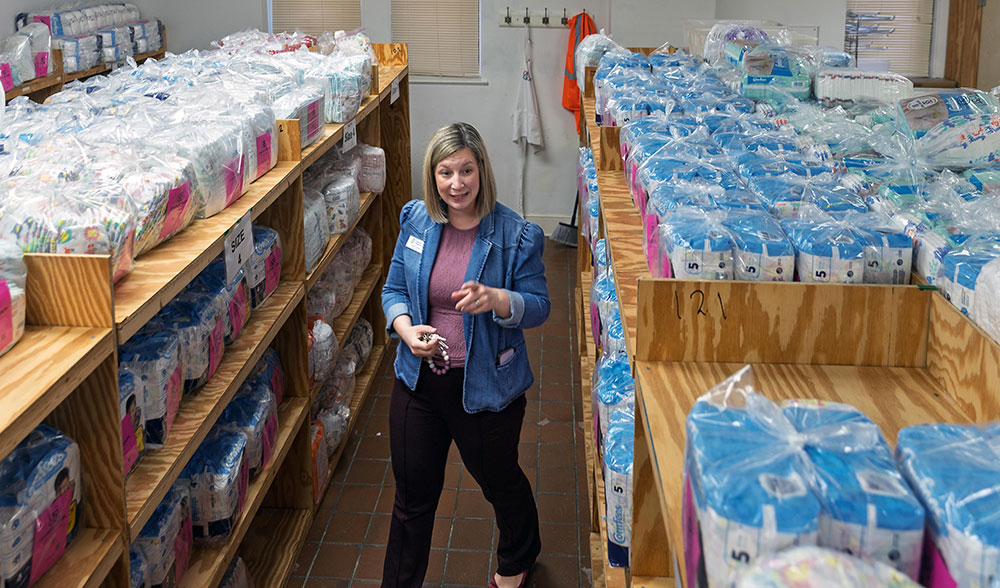“Diapers shouldn’t be a privilege,” says Diaper Train Executive Director Katie Lowek. Instead, she asserts, “Diapers are a basic need.” Yet, there is no assistance in place for diapers. The Supplemental Nutrition Assistance Program (SNAP) and Women, Infants, and Children program (WIC) do not provide diapers, and there are no federal or state programs for diapers. So, Katie asks: “If we don’t provide diapers, who will?”
This year, Diaper Train answered with plans to distribute a million diapers.
As the only diaper bank in Raleigh — and the only diaper bank that exclusively serves Wake County families — Diaper Train provides families with diapers, wipes, and children’s books monthly.
With families spending up to $100 per month per child on diapers, and many families having multiple children in diapers at the same time, Diaper Train serves families in Wake County that need diapers, regardless of the number and age of the children. Most of the families in need of assistance are working families, Katie shares.
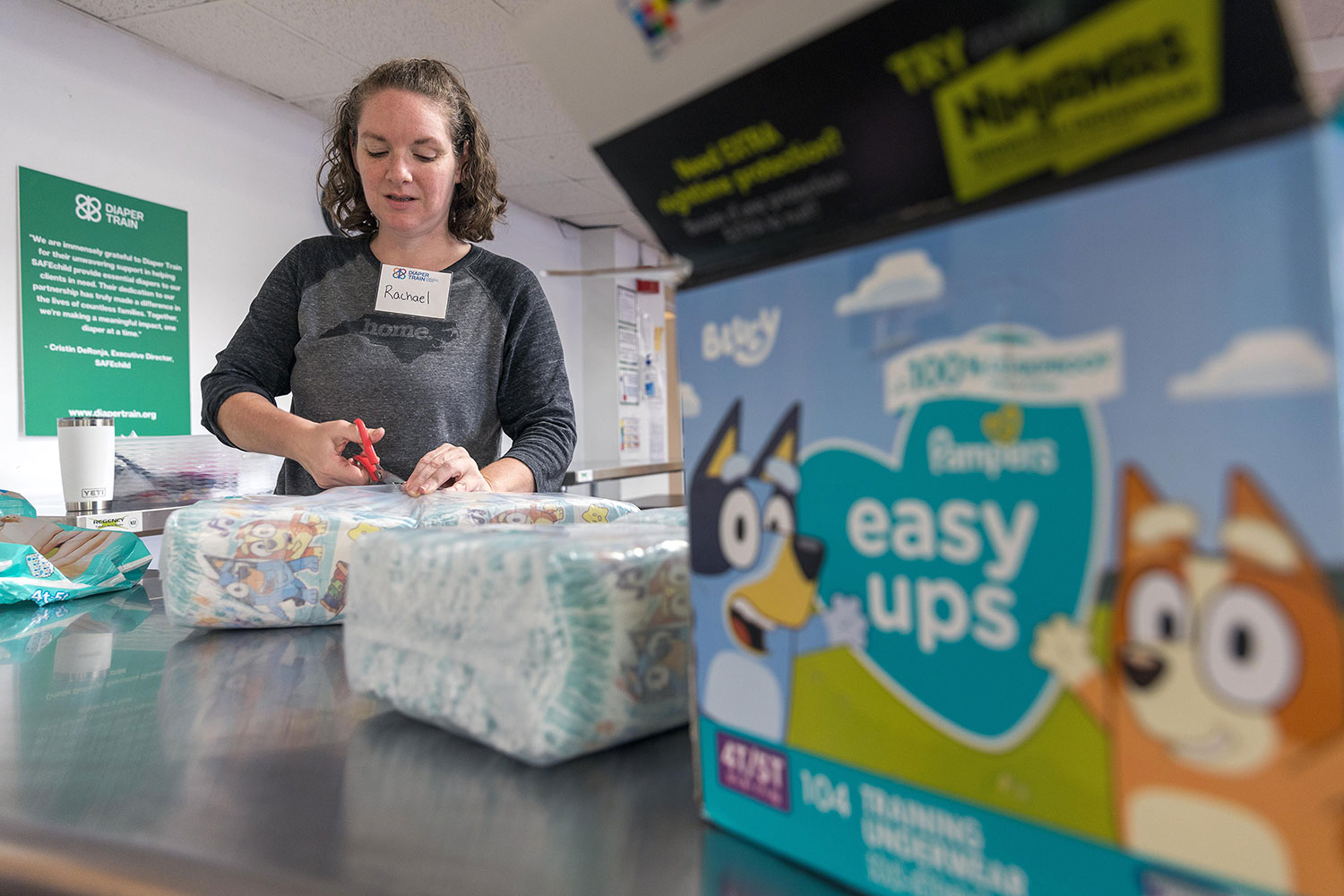
Volunteer Rachael Van Devender opens boxes of diapers, which are then sorted and packaged for clients. For more than 10 years, Diaper Train has provided Wake County families with direct access to diapers.
“I think that’s what surprises people the most: that we’re serving families from one- and two-parent households where one or both parents are working!” she says.
Regardless of a parent or caregiver’s employment status, being unable to provide enough diapers for a child is a major source of stress, anxiety, and worry. Feelings of inadequacy and guilt are reported, and diaper need can also contribute to postpartum stress and other mental health issues.
When parents don’t have enough diapers, Katie discloses, they report leaving children in soiled diapers for up to a whole day before changing them or dumping and reusing diapers. They also admit to using other household items like towels, plastic bags, or T-shirts as alternatives.
Not surprisingly, medical conditions can result when a child is left in a soiled diaper for too long — diaper rash, infections, and more serious medical conditions are all possible outcomes. Notwithstanding the obvious discomfort the child may experience as a result, if a child develops an infection, they typically need to go to the doctor … which often means that parents are forced to take time off work. “We also know that babies with infections cry more,” Katie says, “which means that parents’ stress levels increase.”
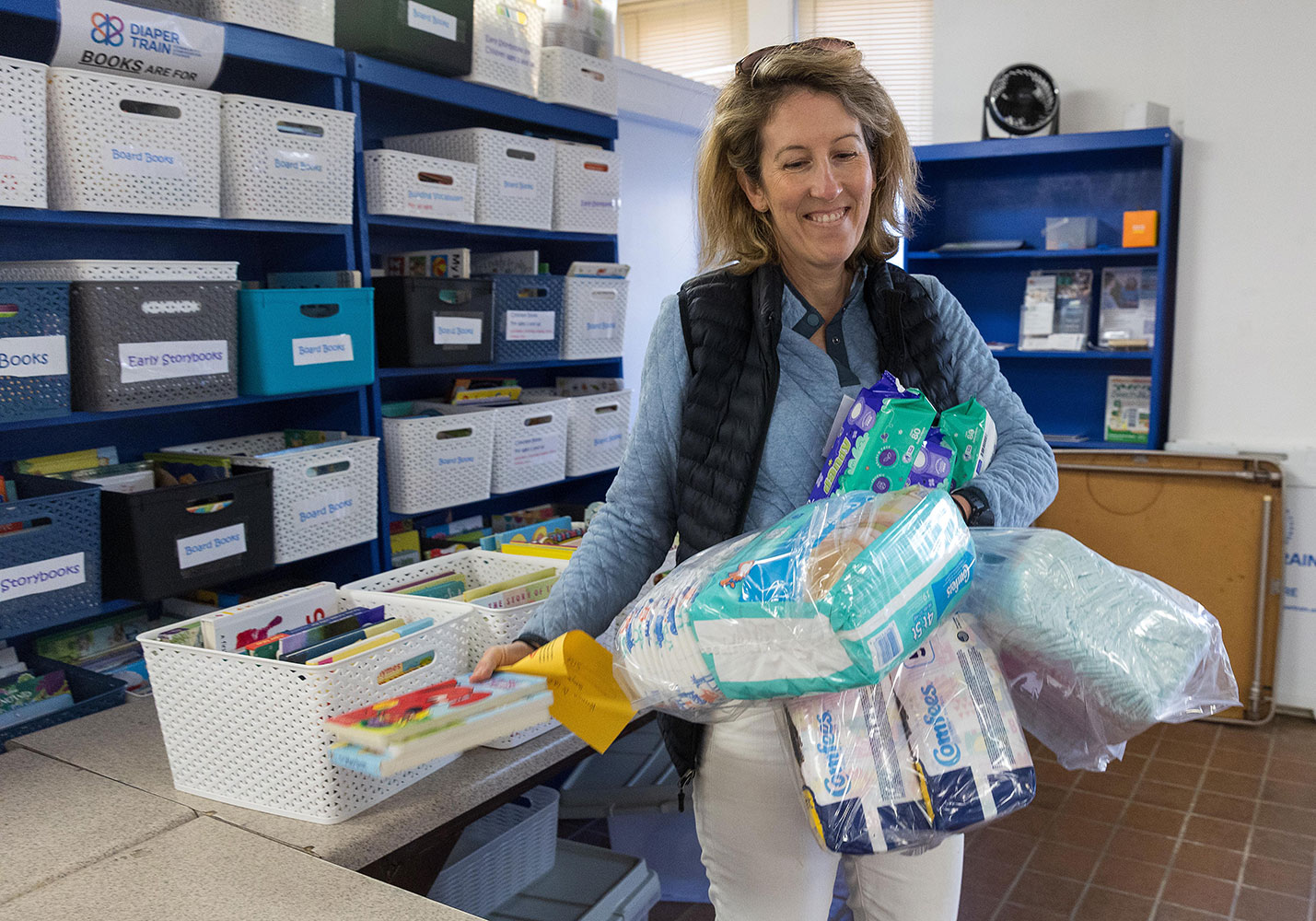
Volunteer Maria Fields fills an order, which includes diapers, wipes, and a children’s book. Diaper Train distributes diapers every four weeks, with each client receiving 30–100 diapers per child, depending on size.
When it comes to the relationship between diaper insecurity and poverty, the connection is undeniable. Katie explains: “Children must have diapers to go to day care. If families aren’t able to provide them, they can’t go. If a child can’t go to day care, a parent or caregiver can’t go to work. If they can’t go to work, they are losing wages.”
Families experiencing diaper need report missing an average of five working days every month … which in turn results in a reduced ability to afford diapers.
Diaper need affects the whole family and the greater community, which is why Diaper Train strives to get diapers into families’ hands in two ways: directly and through distribution partners such as medical facilities, public safety facilities, religious sites, and nonprofit organizations.
The way it works is that families in need are referred to Diaper Train by partners, like Wake County Health & Human Services, so that they can pick up diapers when Diaper Train is open for distribution. They also have distribution partners (like Western Wake Crisis Ministry or InterAct) who order diapers monthly and pick them up for their clients.
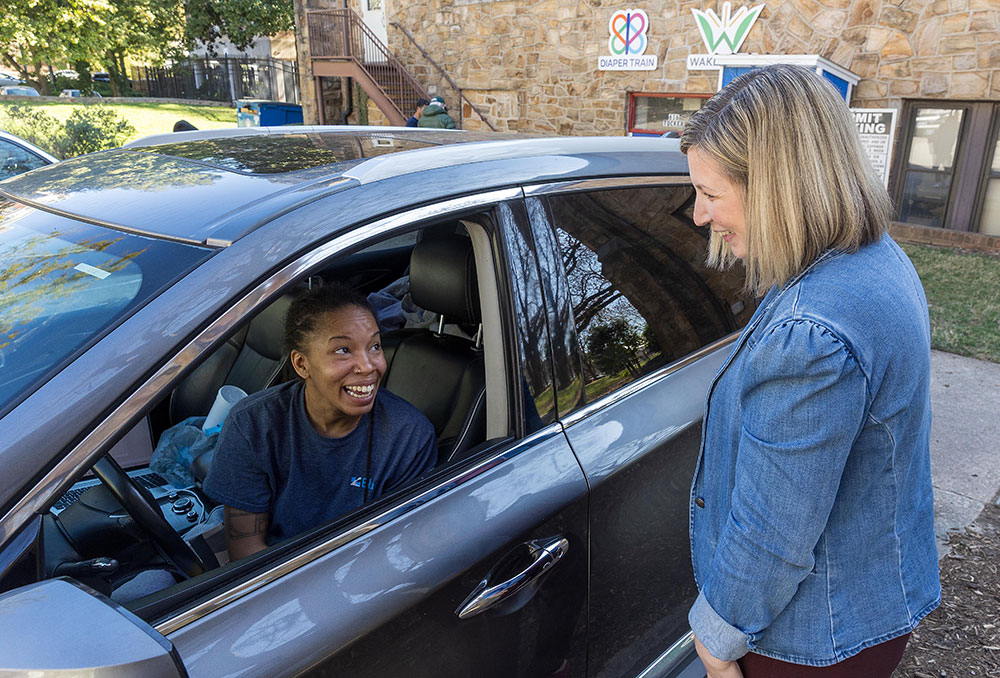
Katie Lowek, right, chats with regular client Angela Edwards, who is raising three 2-year-olds while also working as a full-time accountant. Diaper Train is committed to making sure no family ever has to worry about how they’ll get their next diaper.
Diaper Train is open for distribution Tuesday through Thursday and one Saturday a month. Staff members and volunteers also get out into the community and meet clients at partners’ events.
Katie, who has worked in the nonprofit world for over 17 years — her entire career — has always found herself in positions working with women and children. Before joining Diaper Train, she worked at the Ronald McDonald House of the Triangle. “I absolutely loved my time there, and the families I had the privilege of connecting with,” Katie shares, “but I missed working directly with families in my community.”
Now working side by side with other nonprofits in the Triangle that are all advancing toward a similar mission, Katie tries to be present for distributions and mobile events. “I also spend my time speaking to anyone who will listen,” she acknowledges, “meeting with our community partners and seeking out funding opportunities.”
Despite no two days looking alike for Katie, as executive director it is important that she stays connected to the families Diaper Train serves, supports her team, and thanks the volunteers who help make this important work possible. “We love our volunteers,” she says, “and we rely on volunteers!” Volunteers pack diaper orders for partners, distribute diapers directly to families from the Diaper Train parking lot, and attend mobile events. She sums it up by expressing: “We couldn’t do it without them!”

A child waves to volunteers while her mother takes advantage of curbside pickup at Diaper Train.
Working with families will always be what Katie describes as “gratifying work,” but she also derives great satisfaction from teaching others about why Diaper Train’s mission matters and “seeing that click for them.” While it remains an ongoing challenge to ensure sufficient resources to meet the needs of the community, and Katie admits to feeling frustrated by “the system we live in,” she also describes herself as “here for it.”
Wake County residents can support Diaper Train’s cause by donating at diapertrain.org, hosting a diaper drive, and collecting new and gently used board books. Of course, following Diaper Train on social media and talking about diaper need provide invaluable support as well!
In April, Diaper Train moved into a larger space located at 1812 Tillery Place in Raleigh that allows for more diapers, wipes, and books to be stored. Additional parking isavailable for the families served, volunteers, and donors. Katie explains: “More space means we can welcome more volunteers and larger volunteer groups. We also plan to share our meeting spaces with our partners to expand our programs.”
According to Katie: “The children in this state, in this country, deserve better!” Fortunately, Diaper Train has got that covered.
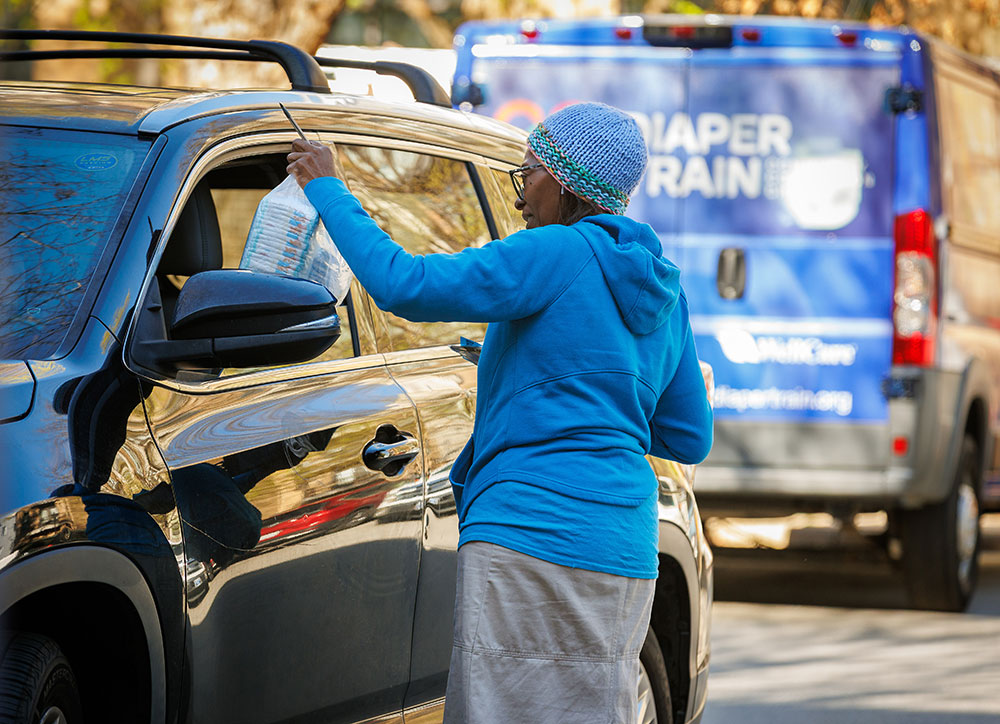
Diaper Train volunteer Christy Mitchell delivers a bag of diapers.
Social media is the best way for people to stay informed about upcoming activities, such as the annual fundraiser event, Bottoms Up, on Friday, September 19.
- Garden Adventurer: Night-lilies
- Erica Chats: Fashion: It’s More Than Skin Deep!
- Out & About in Wake County: May/June 2025
- Celebrated Spirits: Yellow Umbrella
- Celebrated Spirits: Shark’s Tooth
- Shaped by Place
- 25 Years of Koka Booth Amphitheatre
- Pay It Forward: Diaper Train
- Small Business Spotlight: Young Writers’ Institute
- Art for All
- Indelible Ink
- Roadtrip to Raleigh
- A Song for Every Season




